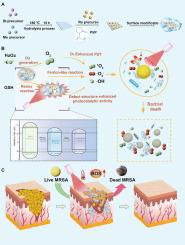用于光催化治疗耐药细菌感染的缺氧 Bi2MoO6@sRuO2@HA 异质结
IF 13.3
1区 工程技术
Q1 ENGINEERING, CHEMICAL
引用次数: 0
摘要
抗菌光催化疗法(APCT)是一种治疗细菌感染的前景广阔的治疗策略,但它面临着光利用效率低、活性氧(ROS)生成不足和抗菌效果有限等挑战。为解决这些问题,本研究构建了一种新型 Bi2MoO6@sRuO2@HA 异质结(BMOsRH 异质结)。这种异质结的关键创新点在于引入了 sRuO2,它为 Bi2MoO6 中分离的电子和空穴提供了有效的电荷载流子转移界面,大大延迟了电子-空穴重组,促进了产生高毒性 ROS 的氧化还原反应,从而增强了抗菌效果。密度泛函理论(DFT)计算表明,BMOsRH 的光催化活性在近红外光吸收、缺陷和异质结的三重作用下得到增强。因此,在近红外光和过氧化氢的共同作用下,BMOsRH 对大肠杆菌和耐甲氧西林金黄色葡萄球菌(MRSA)的抗菌活性接近 100%,还能破坏它们的生物膜。此外,在 MRSA 感染的小鼠伤口和脓肿模型中,BMOsRH 通过温和的光热疗法有效地消灭了细菌,并显著降低了炎症因子 IL-1β 和 TNF-α,促进了伤口的快速愈合。总之,这种光控治疗策略在抗菌方面显示出巨大的应用潜力。本文章由计算机程序翻译,如有差异,请以英文原文为准。

Oxygen-Deficient Bi2MoO6@sRuO2@HA heterojunction for photocatalytic treatment of drug-resistant bacterial infections
Antibacterial Photocatalytic Therapy (APCT) is a promising therapeutic strategy for the treatment of bacterial infections, but it faces challenges such as low light utilization efficiency, insufficient reactive oxygen species (ROS) generation, and limited antibacterial efficacy. In this work, a novel Bi2MoO6@sRuO2@HA heterojunction (BMOsRH heterojunction) was constructed to address these limitations. The key innovation of this heterojunction lies in the introduction of sRuO2, which provides an effective charge carrier transfer interface for separated electrons and holes in Bi2MoO6, significantly delaying electron-hole recombination and promoting redox reactions that generate highly toxic ROS, thus enhancing antibacterial effects. Density functional theory (DFT) calculations indicated that BMOsRH possesses photocatalytic activity triply enhanced by near-infrared light absorption, defects, and the heterojunction. Consequently, under the combined action of near-infrared light and hydrogen peroxide, BMOsRH exhibited nearly 100 % antimicrobial activity against Escherichia coli (E. coli) and Methicillin-resistant Staphylococcus aureus (MRSA), and could also disrupt their biofilms. Furthermore, in mouse wound and abscess models of MRSA infection, BMOsRH effectively eliminated bacteria via mild photothermal therapy and significantly downregulated the inflammatory factors IL-1β and TNF-α, promoting rapid wound healing. In summary, this light-controlled therapeutic strategy shows great potential for antibacterial applications.
求助全文
通过发布文献求助,成功后即可免费获取论文全文。
去求助
来源期刊

Chemical Engineering Journal
工程技术-工程:化工
CiteScore
21.70
自引率
9.30%
发文量
6781
审稿时长
2.4 months
期刊介绍:
The Chemical Engineering Journal is an international research journal that invites contributions of original and novel fundamental research. It aims to provide an international platform for presenting original fundamental research, interpretative reviews, and discussions on new developments in chemical engineering. The journal welcomes papers that describe novel theory and its practical application, as well as those that demonstrate the transfer of techniques from other disciplines. It also welcomes reports on carefully conducted experimental work that is soundly interpreted. The main focus of the journal is on original and rigorous research results that have broad significance. The Catalysis section within the Chemical Engineering Journal focuses specifically on Experimental and Theoretical studies in the fields of heterogeneous catalysis, molecular catalysis, and biocatalysis. These studies have industrial impact on various sectors such as chemicals, energy, materials, foods, healthcare, and environmental protection.
 求助内容:
求助内容: 应助结果提醒方式:
应助结果提醒方式:


